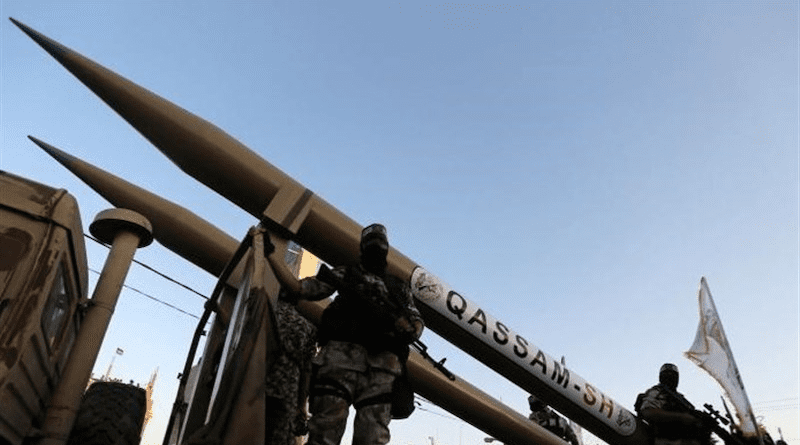The Geopolitics Behind Hamas’ Unprecedented Attacks On Israel – Analysis
Israel has declared that it is in a ‘State of War’ with Hamas (Islamic Resistance Movement), an Iranian-controlled Palestinian militia, which launched an unprecedented large scale offensive into Southern Israel on October 07, 2023 attacking Israel at 22 locations by coordinated ground, sea and air attacks using paragliders and drones. Middle East geopolitical dynamics were evidently in motion as the scale of Hamas coordinated offensive and its timing suggested that Hamas could have only launched this offensive with operational planning, guidance and military support from its main patron—Iran.
Public statements by Iranian Supreme Religious Leader and Iranian President extolling the Hamas offensive into Israel lend credibility to Iranian fingerprints in launching the massive Hamas offensive. Fighting between Hamas and Israeli Forces has entered the third day.
Israel on October 07, 2023 was inflicted to horrific surprise attacks by Hamas, the radical terrorist organization, which controls the Gaza Strip, in what is being verily compared as Israel’s Pearl Harbor or 9/11 moment. Hamas operates out of Gaza Strip (42 km long and 10 km wide) which it controls since 2007. Hamas has in the past limited its attacks on the Israeli State to terrorist attacks and suicide bombings. Hamas avowed aim is to destroy the Jewish State and liberate all Palestinian lands.
Hamas attacks last Saturday, which was a Jewish religious holiday, nearly 50 years to the day of Yom Kippur War 1973, marked an unprecedented resort to a massive combined assault on first day of 5,000 rockets fire with ground infiltration by hundreds of Hamas terrorists into Southern Israel on shooting spree killing innocent Israeli civilians and Israeli soldiers. Hamas also used paragliders for infiltration besides boats by sea. Hamas attacks were at multiple points in Southern Israel numbering 22 locations.
Israel like the United States at Pearl Harbor and 9/11 suffered from a total strategic and tactical in intelligence failure. Notwithstanding the foregoing, Israel has launched massive retaliatory air strikes and has declared that ‘Israel is at War’. Coming from Israel, this is an ominous declaration which suggests that Israel would now aim at “complete destruction of Hamas”.
Perceptionaly, Israel has no option but to aim at the ‘Complete Destruction of Hamas initially and then Hezbollah in Lebanon” to ensure continued existence of the Jewish State.
Herein, comes into play regional and global geopolitical factors which will induce geopolitical dynamics in its wake, with many imponderable hovering. First, a brief recount of initial global reactions to the unprecedented Hamas offensive into Israel needs to be taken to provide the geopolitical context.
United States, European Union Nations, Japan and South Korea and other US Allies have strongly condemned the unprovoked Hamas offensive against Israel, killing of nearly 900 Israeli civilians, nearly 7,000 wounded and hostage-taking of 100 Israeli civilians including some soldiers. India too has strongly condemned the Hamas terrorist offensive. This time there is widespread global support for Israel.
Russia and China have shirked from outright condemnation of Hamas attacks on Israel and expressed that they are deeply concerned. Russia and China have called for no further escalation of conflict.
In the Arab world, major countries like Egypt, Saudi Arabia and UAE have come out with measured statements keeping sentiments of the Arab Street in mind. It needs to be recalled that Saudi Arabia was currently engaged in peace talks with Israel.
Islamic countries which stand-out in full support of Hamas Offensive against Israel are with Iran in the lead, Yemen, Syria, Iraq and Qatar. Notably, the Organization of Islamic Cooperation has condemned Israel for its air-strikes on Gaza Strip in retaliatory actions.
The Hamas Offensive would not have been possible without Iranian arms smuggling into Gaza Strip and financial aid to Hamas draws in Iran into the Hamas-Israel War. Israel can be expected to escalate the War both as revenge for large scale of Israelis killed and wounded and also for complete extermination of Hamas terrorist scourge from the Gaza Strip.
What are Iran’s options in the above war scenario? Can Iran risk an all-out war with Israel, which could then bring about a US Military Intervention? Can Iran risk extermination of Hamas from Gaza Strip by Israel and lose a valuable Iranian proxy on Israel’s doorstep? Can Iran afford to lose “face in Islamic World” extermination by letting an Islamic Militia financed and supported by it? Will Iran order Hezbollah to launch a Ground Offensive against Israel from the North? In the foregoing eventuality, what would be the impact on Hezbollah’s existence as Iran’s most powerful Militia in Lebanon? How would Iran react in case Israel decides to carry out its long planned pre-emptive strikes on Iran to destroy its nuclear weapons production capability, which threatens Israel’s very existence?
While many analysts have opined in the last three days that Iran is winner on all counts, whatever the outcome of Hamas-Israel War, analysis of the questions posed by me above, would indicate that Iran could end up as a loser geopolitically. Geopolitical losses of Iran will far outweigh the purported gains that analysts have endowed with it on being successful in “Scuttling the Saudi Arabia-Israel Peace Talks”
Concluding, it is my assessment that Iran having mounted the ‘Tigers’ of Hamas and Hezbollah may not be now be able to dismount from them. In the backdrop of this ill-advised Hamas Offensive against Israel lurk dangers of a wider conflict in the Middle East. On present indicators, the prospects of the Hamas-Israel War being a ‘Limited War’ are dim, even if the United States wishes it to be. Geopolitical dynamics unleashed by the Hamas Offensive portend a wider conflagration in the Middle East.

